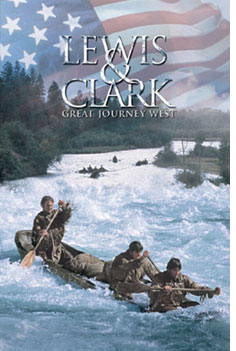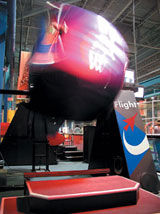Lewis & Clark:
Great Journey West
 History
lessons don’t
get much more spectacular than Lewis & Clark:
Great Journey West, an OMNIMAX® film by National
Geographic film that recreates highlights of the 8,000-mile
trek
of the famous duo and their Corps of Discovery. History
lessons don’t
get much more spectacular than Lewis & Clark:
Great Journey West, an OMNIMAX® film by National
Geographic film that recreates highlights of the 8,000-mile
trek
of the famous duo and their Corps of Discovery.
With
its breathtaking aerial views, symphonic and punchy
musical scores, and a narration by Jeff Bridges,
this film lets you experience the awe and the anxiety
that
the explorers themselves felt.
With the young Shoshone
mother Sacagewea to guide them, and numerous tribes
aiding them along the way, they
saw what few Europeans had ever seen. The big screen
brings you the full experience, from an immense herd
of buffalo stampeding across a golden prairie, to
a grizzly bear chase, and a chattering prairie dog
brushing
flies from his face—a sign of the insect hordes
that plagued the explorers. The film compresses the
entire journey into an exciting 40-minutes and whets
your appetite to learn more about America’s most
intrepid explorers.
Navigating with Lewis and Clark
at Henry Buhl, Jr. Planetarium & Observatory
Buhl
Planetarium Director John Radzilowicz notes that
while the OMNIMAX® film starts the expedition in
St. Louis, the planetarium show begins the journey
in Pittsburgh, which the explorers marked as their
departure point.
This 40-minute show focuses on how Lewis and Clark
used celestial navigation on their way to the West
Coast.
A feature of the planetarium
program is the appearance by Eugene Gass Painter
of Washington, Pa., the great-grandson of Patrick Gass—the
longest-surviving member of the Lewis and Clark expedition.
Patrick Gass published
the first account of the trip, and his great-grandson,
wearing period costume, reads from this published
journal.
Back to Contents
 UPMC SportsWorks UPMC SportsWorks
While most exhibit pieces have remained in place since
UPMC SportsWorks opened, new activities, programs,
and interactions are always being added to keep things
fresh. They provide visitors a reason to return to
the 40-plus exhibits of virtual games and sporting
events, which range from Olympic bobsledding and hang
gliding to hockey and roller coasters.
A good example
of change is at the Rock Climbing Wall. “This
exhibit is very popular,” says Steve Kovak,
UPMC SportsWorks staff educator. “People do
it a number of times, but it was always the same
experience. So
one of our staff members came up with different paths
along the wall that have been color-coded to create
beginner, intermediate and advanced levels. We made
it a little different to challenge people a little
more.”
 The
flight simulator for a FA-18 fighter jet — The
flight simulator for a FA-18 fighter jet —
the
closest experience you can have to flying a
real fighterjet.
This visitor-controlled ride gives
two people a full-body,
full-motion experience,
moving 360 degrees on three
axes.
Visitors can also look for the new “roaming” demonstrations
at every visit. “People have a hard time staying
focused on one thing for long because there’s
so much to do here,” says Kovak. “So
roaming demonstrators walk around with props to
interact with
visitors.” These short “skits” include
Drafting Quarters where a quarter and a small piece
of paper show how air resistance works and Human
Knot—a
rope trick where two people are tied together and
challenged to escape. “We try to make all
the demonstrations open-ended so the kids have
to figure out the answers,” says
Kovak. The exhibit demonstrations which explain
what will happen in detail before visitors start
playing,
and the gallery demonstrations which offer a
more in-depth
look into the exhibit and the science behind
it, receive regular facelifts
as well.
One of the most popular additions to UPMC SportsWorks is
the Birthday Parties, which includes use of the party
room for one
hour, a
15-minute science demonstration, a commemorative
T-shirt for
the birthday child, and run of all
the exhibits. Refreshments are available upon
request.
UPMC SportsWorks is made pos-sible
through the generous support of the University
of Pittsburgh
Medical Center.
Back to Contents |